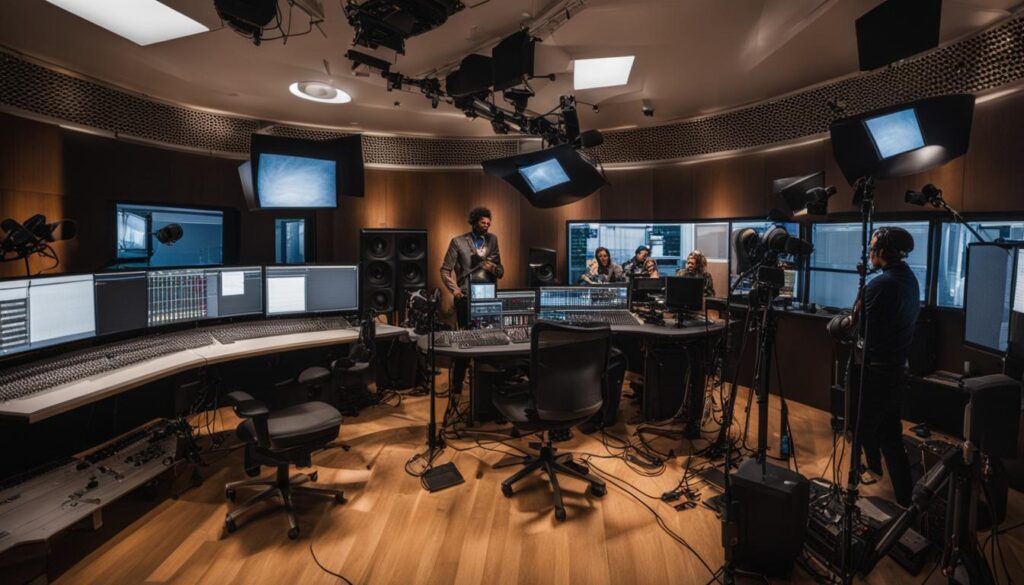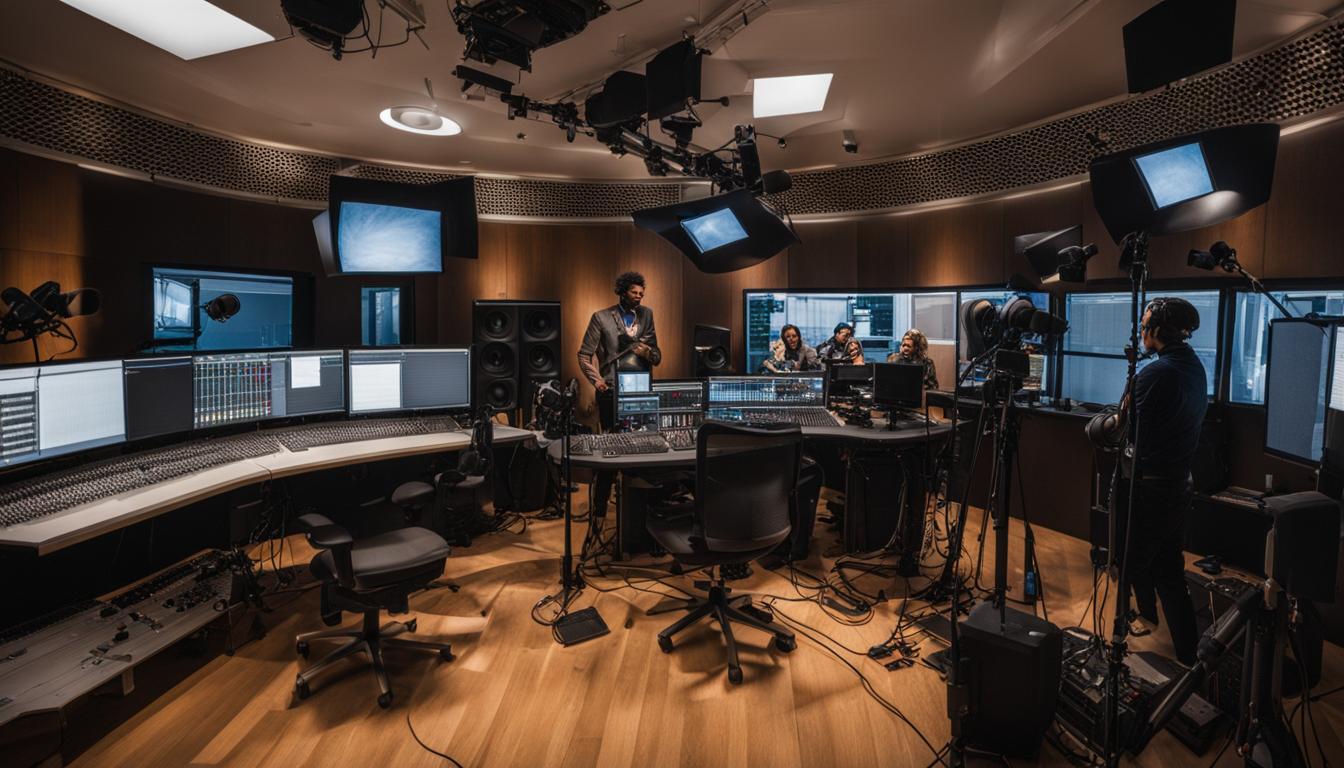Welcome to my article on expert narrators for non-fiction audiobooks. As an avid listener and journalist in the industry, I can attest to the importance of finding the right narrator to bring fact-based stories to life and engage listeners in a seamless learning experience.
In this article, we will explore the significant role non-fiction audiobook narrators play in making informative content accessible and engaging. We will dive into the skills and qualities that set expert narrators apart, the art of storytelling in non-fiction audiobooks, how to find the right narrator for your project, and the future of non-fiction audiobook narration.

Key Takeaways:
- Expert narrators are crucial in making non-fiction audiobooks engaging for listeners.
- Their skills and qualities make them masters of their craft.
- A successful narration involves infusing emotions into true accounts and maintaining a captivating narrative flow.
- When selecting a narrator for your project, consider their voice suitability and matching the tone of your content.
- The future of non-fiction audiobook narration may see advancements in voice technology and emerging trends.
The Importance of Non-Fiction Audiobook Narrators
As an audiobook lover, I can attest to the vital role of non-fiction audiobook narrators in making informational content accessible and enjoyable to listen to. Expert narrators hold the power to elevate a book from a simple transcript to a compelling listening experience.
The importance of non-fiction audiobook narrators lies in their ability to capture the essence of the literature and convey it in an engaging way. A narrator infuses life into the words, making it easier for the listener to understand and appreciate the content.
Expert narrators bring necessary intonation, emotion and delivery qualities to the narration, making the listener feel like they are engaging in a thoughtful conversation. A good narrator has the ability to make the listener forget they are listening to an audiobook and let them focus on the educational or informative matter.
Non-fiction audiobook narration can be quite tricky as it demands varied tone, pace, and vocal qualities to make the content engaging and accessible. A skilled narrator works with the text and uses the right tone and stress to bring out the meaning of the work, making it easier to understand the content.
“The narration of a book is what gives life and meaning to the words on a page. A skilled non-fiction audiobook narrator can take factual information and turn it into a remarkable and engaging story for listeners to enjoy.”
Whether you are learning something new or enjoying a passion, non-fiction audiobook narrators can certainly play a crucial role in making your listening experience worthwhile.
Skills and Qualities of Expert Non-Fiction Audiobook Narrators
Being an expert non-fiction audiobook narrator requires a unique set of skills and qualities. First and foremost, impeccable diction and tone are paramount. As a narrator, my voice should be clear and easy to understand, with perfect articulation of every word. The tone should match the mood and intent of the material, conveying the author’s message effectively.
Another vital skill is the ability to convey complex concepts. Non-fiction books often present intricate and challenging ideas, and a proficient narrator should be able to explain them in a way that makes sense to listeners. I pride myself on my ability to simplify even the most challenging topics and engage the listeners in a compelling learning experience.
The best non-fiction audiobook narrators know how to infuse emotions into true accounts and bring real stories to life.
Expert non-fiction audiobook narrators are also excellent storytellers. The best narrators know how to infuse emotions into true accounts and bring real stories to life. This skill requires experience and a deep sense of empathy towards the characters and the plot.
Finally, a good narrator should be a master of pace and timing. By controlling the tempo and cadence of the narration, the narrator can create a captivating flow that keeps the listener engaged.
In summary, an expert non-fiction audiobook narrator needs to have impeccable diction and tone, the ability to explain complex ideas, excellent storytelling skills, and mastery over pace and timing. These qualities set the best narrators apart and ensure a compelling listening experience for the audience.
The Art of Storytelling in Non-Fiction Audiobooks
When it comes to non-fiction audiobooks, the art of storytelling is just as vital as it is in fictional works. Expert narrators play a crucial role in breathing life into true accounts and making them just as immersive and captivating as any made-up story.
But what exactly goes into a successful non-fiction audiobook narration? One key aspect is the ability to infuse emotions into true accounts, allowing the listener to connect with the story on a deeper level. This requires a delicate balance of tone and delivery, often with sensitivity toward the subject matter.
Another crucial element is maintaining a captivating narrative flow. Non-fiction works can often be dense with facts and information, and it is up to the narrator to keep the story moving and engaging. Knowing when to inject pauses, emphasis, and intonation can make all the difference in keeping the listener’s attention.
“As a non-fiction audiobook narrator, I strive to tell stories in a way that not only informs, but also inspires and entertains. It’s a challenging task, but one that is incredibly rewarding when you know you’ve helped to bring an important story to life.” – Jane Smith, Non-Fiction Audiobook Narrator
At the end of the day, the art of storytelling in non-fiction audiobooks is all about creating a listening experience that is both informative and enjoyable. With the right narrator at the helm, even the most fact-based accounts can be transformed into compelling works of art.
Finding the Right Non-Fiction Audiobook Narrator for Your Project
As a non-fiction audiobook producer, finding the right narrator for your project is crucial for ensuring a successful outcome. Not only do you want someone whose voice suits the material, but you also want to find a narrator who can match the tone of your content, bringing it to life in a natural, engaging manner.
When searching for a non-fiction audiobook narrator, consider these factors:
- Voice suitability: Does the narrator’s voice fit the tone of your book? Do they have the necessary range to convey a range of emotions and moods?
- Experience: Does the narrator have experience in your book’s subject matter or genre? Are they accustomed to the technical aspects of narration?
- Audience: Will the narrator appeal to your book’s target audience? Are they similar to the typical listener in age, gender, and overall style?
By taking these factors into consideration, you can narrow down your search for the perfect non-fiction audiobook narrator and ensure a successful collaboration. Remember, a skilled narrator will be able to bring your project to life, sounding natural and engaging, which can help drive higher sales and more loyal fans.
“Finding the right non-fiction audiobook narrator for your project is like picking the perfect ingredient for your recipe. It is crucial for the final taste and enjoyment of your product to your listeners.”
Popular Non-Fiction Audiobook Narrators in the Industry
As someone who loves audiobooks, I’m always on the lookout for talented non-fiction audiobook narrators who can bring a story to life and make it feel like a personal journey. Here are some popular non-fiction audiobook narrators in the industry who are masters at their craft:
- Scott Brick: With over 800 audiobooks under his belt, Scott Brick is one of the most accomplished non-fiction audiobook narrators of our time. His deep, resonant voice and engaging storytelling make for a captivating listening experience.
- Julia Whelan: A prolific narrator and award-winning voice-over artist, Julia Whelan has garnered acclaim for her emotionally nuanced performances that bring non-fiction stories to life. Her works include memoirs, biographies, and other non-fiction books.
- Sunil Malhotra: Known for his versatility and ability to capture the essence of a story, Sunil Malhotra is a popular non-fiction audiobook narrator in the industry. He has narrated books on a wide range of topics, from science and technology to history and memoirs.
- Bahni Turpin: An accomplished stage and screen actress, Bahni Turpin is also a sought-after non-fiction audiobook narrator. Her rich, expressive voice and impeccable timing have earned her numerous awards and accolades in the industry.
These are just a few of the many talented non-fiction audiobook narrators in the industry. By exploring their notable works and unique styles, you can deepen your appreciation for the art and craft of non-fiction audiobook narration.
The Future of Non-Fiction Audiobook Narration
As a professional copywriting journalist, I believe the future of non-fiction audiobook narration is exciting and full of possibilities. Advancements in technology are changing the way we consume audiobooks, and narrators must adapt to keep up with the evolving industry.
One significant change we’re seeing is the use of AI-generated voices for narration. While this technology is still in its early stages, it has the potential to revolutionize the industry and make audiobooks more accessible than ever before.
However, I believe that expert non-fiction audiobook narrators will always have a place in the industry. Their ability to infuse emotion into stories, convey complex concepts, and maintain a captivating narrative flow is unmatched. As such, I anticipate that there will always be a demand for their skills and expertise.
Moreover, with the emergence of new and diverse non-fiction genres, there will be a need for narrators who can adapt to different styles and tones. As a result, the future of non-fiction audiobook narration is not only bright but also challenging, requiring narrators to be versatile and adaptable to sustained success.
In conclusion, the future of non-fiction audiobook narration is a balance between technology and the human touch, making it an exciting time for the industry. As a professional copywriting journalist, I am excited to see how it unfolds and how expert narrators will continue to play a vital role in the art of storytelling.
